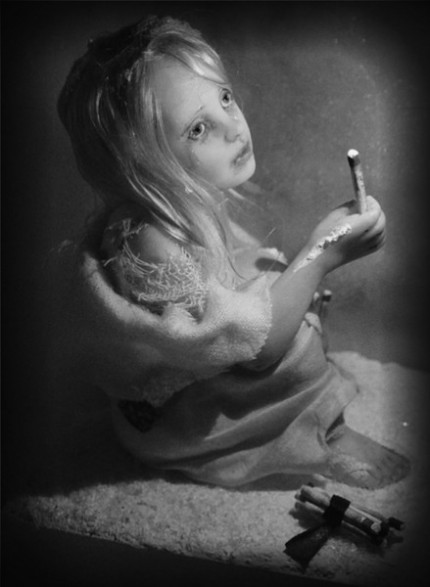Lang’s “Match Girl Passion” receives luminous local premiere at Ravinia

David Lang was always struck by the beauty and expressive intensity of Bach’s Passions but said, as a Jewish composer, he always felt at one remove because of the inherently Christian nature of the Gospel texts relating Jesus’s crucifixion and death.
“The Little Match Girl” was Lang’s inspiration for a more secular take on human suffering. The Hans Christian Andersen tale tells of the plight of the impoverished little girl on a freezing New Year’s Eve. Rather than go home to her abusive father, the girl lights matches one by one seeing glorious visions including her deceased grandmother. In the morning, she is found frozen to death with a smile on her face.
Lang’s The Little Match Girl Passion had its Chicago-area premiere Monday night at Ravinia’s Martin Theatre with the composer in attendance.
Despite Lang’s secular intent, The Little Match Girl Passion maintains a nominally Christian perspective. The suffering little girl dreams of a happier life with her deceased, loving grandmother who comforts the girl in her suffering and leads her to heaven in her visions (or, for skeptics, the girl’s soothing but illusory dying dream).
Whatever its spiritual freight or lack thereof, The Little Match Girl Passion is an ingeniously wrought and often quite beautiful work, a deserved winner of the Pulitzer Prize for Music in 2008.
Lang sets his own retooling of the Andersen text, as well as drawing from additional sources, for a quartet of singers who double on small percussion instruments. The parable’s lines are cast in overlapping repetitions for the four singers and Lang is quite skillful in combining the intimate voices with the luminous shimmering of bells and fateful drum taps.
There is great craft and delicacy in the score as in the “Lord Have Mercy” section as voices and chimes coalesce. At its best, there is a timeless, evocative quality to The Little Match Girl Passion, a slow-moving sense of space with Lang’s music echoing some of the ancient purity of chant or medieval music (di Lasso surfaces at times) with his own concentrated 21st-century idiom.
The performance could not have been rendered with greater or more tasteful advocacy by the quartet of performers. Tenor-conductor Grant Gershon led the exceptionally well blended quartet with soprano Elissa Johnston, mezzo Adriana Manfredi and bass-baritone Cedric Berry as seamless in their instrumental assignments as with their solo and corporate vocalism. The composer was on hand to share in the enthusiastic applause.
Note: Gershon will be back to lead another contemporary work drawing on past spiritual models with the local premiere of John Adams’ The Gospel According to the Other Mary, which will close Ravinia’s classical summer season on September 7.
__________
Eighth blackbird made their Ravinia debut on the first half of the program with music that was clearly designed to provide maximum contrast with the meditative Little Match Girl Passion.
Andy Akiho’s erase certainly made a bracing start to the evening with the alarmingly gifted sextet (violin, cello, piano, clarinets, flutes and percussion) fully in synch with the work’s brash motoric energy and timbral flourishes, most notably the loud scraping of the piano strings. If the hard-charging piece goes on a bit, with more false endings than Sinfonia domestica, the sustained intensity and final fade on wooden percussion proved impressive.
Nico Muhly’s Doublespeak alternates proto-Minimalist rhythmic churning with a pensive middle section that allowed more restrained solo moments, notably from cellist Nicolas Photinos.
The ensemble has enjoyed a long relationship with David Lang, and the composer wrote these broken wings for eighth blackbird in 2007. The tripartite work frames dynamic outer sections against a dirge-like middle movement. There, against sustained notes from violin, cello and bass clarinet, chains of various sizes are dropped on small wooden boxes, the resulting crashes initially jarring, though seeming a bit gimmicky as the movement unfolded.
Eighth blackbird’s aggressive take-no-prisoners virtuosity proved fitfully overwhelming in the live acoustic of the Martin Theatre with high frequencies in the first movement of these broken wings piercing at times. A less relentless program might have showed eighth blackbird’s bona fides in a wider context, though this was undoubtedly a powerful and successful Ravinia debut.
Posted in Performances




